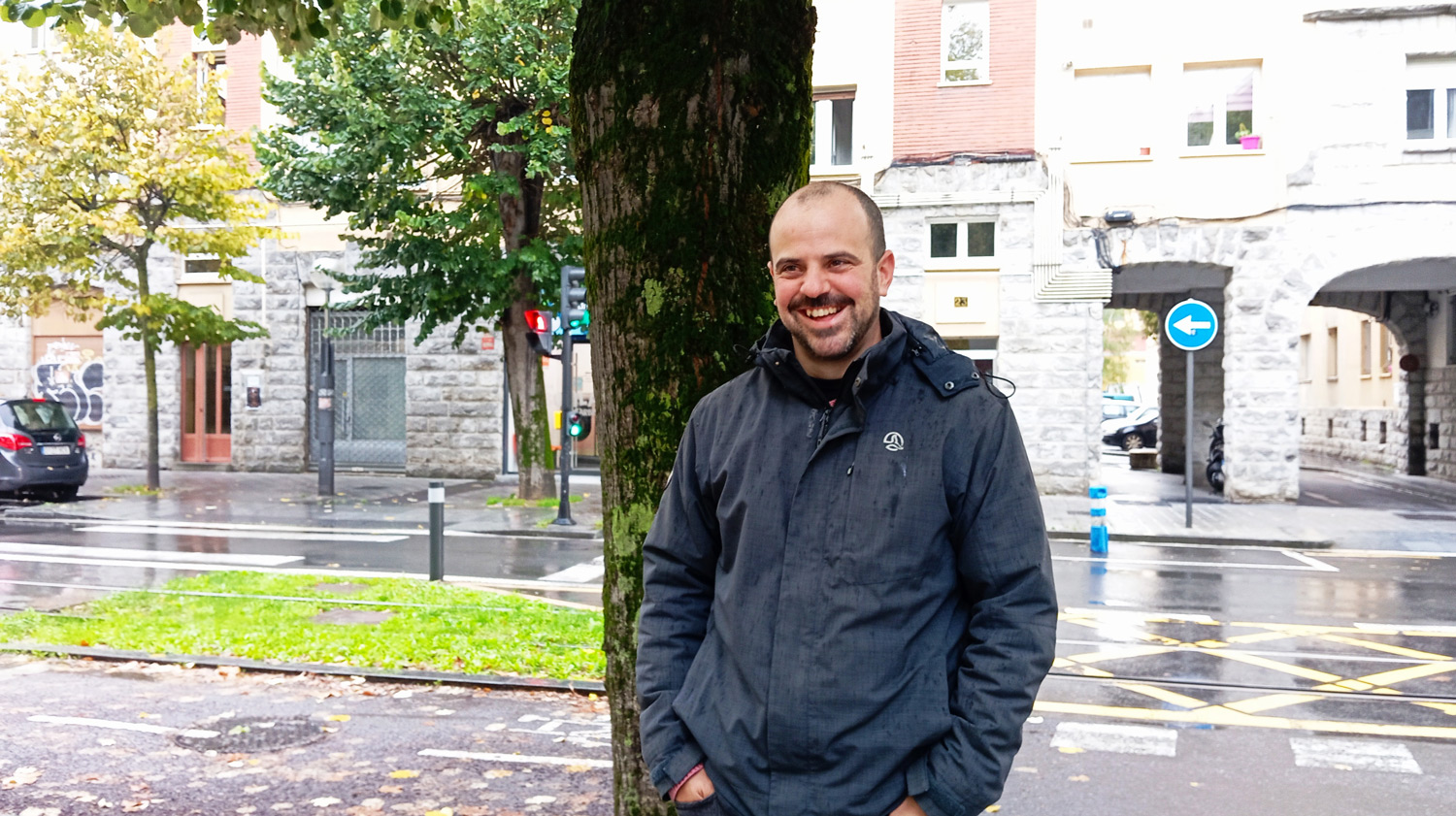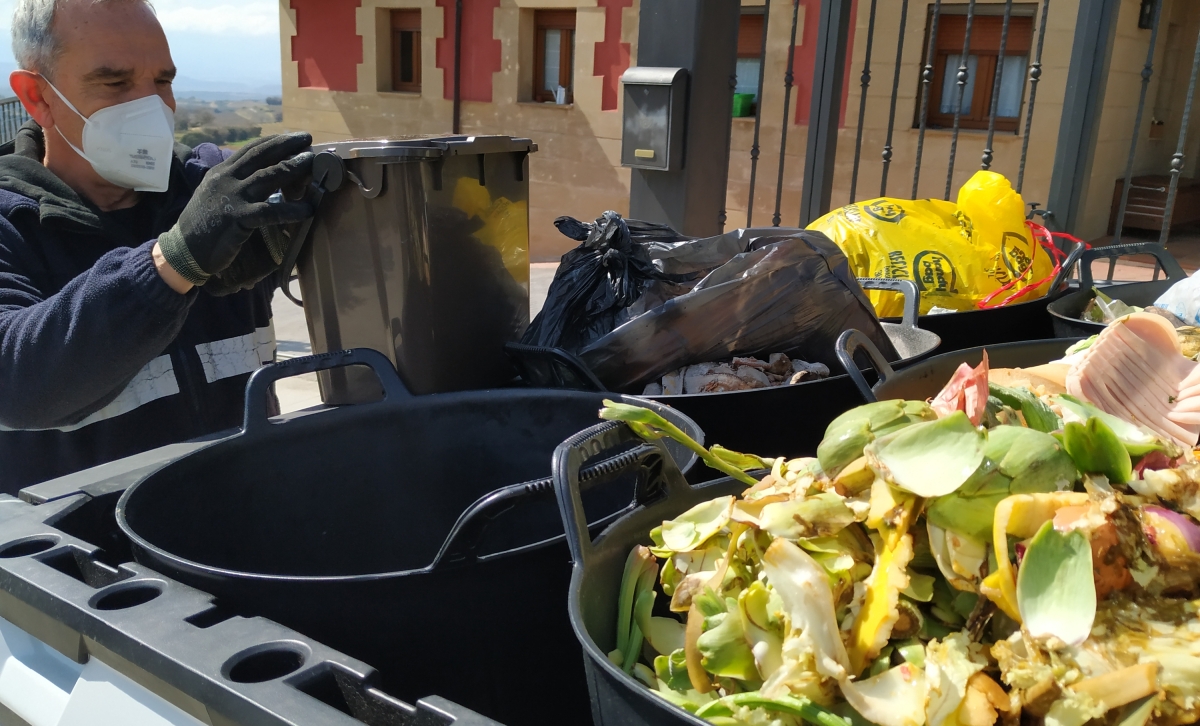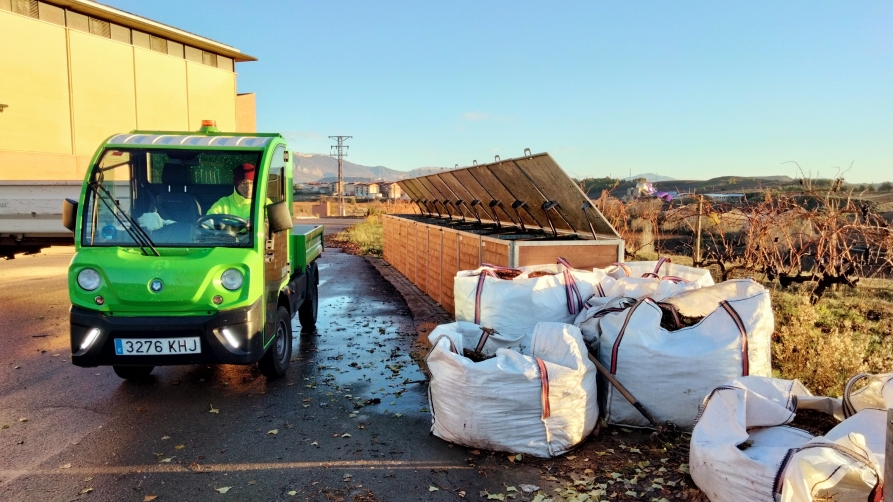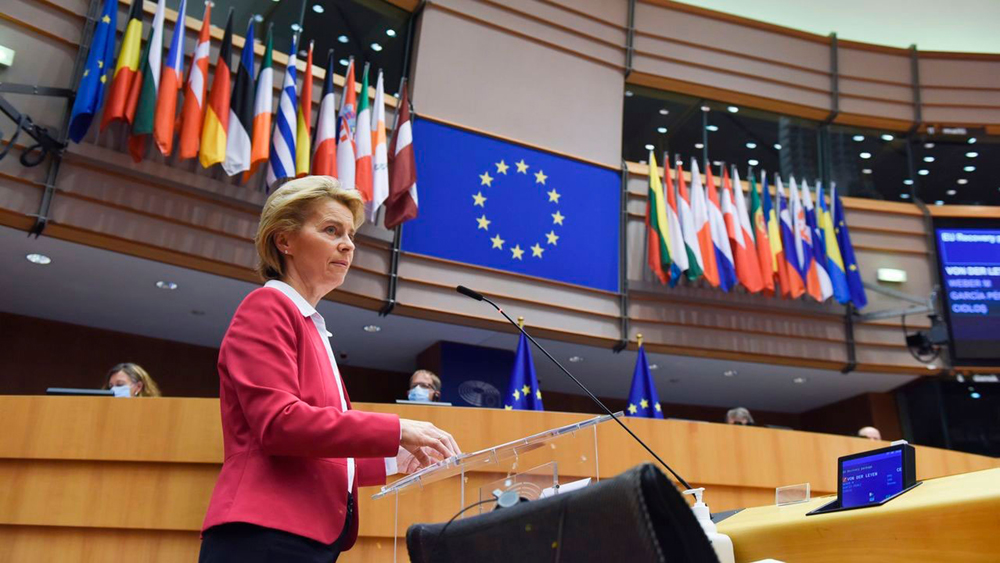“The voluntary method has its own cap and with this cap the regulations cannot be complied with”
From the Puerta to Puerta, the municipalities of Kripan and Elciego de Rioja Alavesa have the best data of selective collection and recycling of waste from all of Álava, being the only ones that reach the minima established by Europe. In short, the system will extend to more localities of the crew throughout this year. ARGIA spoke to Aitor Senar Enekotegi, a Crew Environment technician, about the achievements and challenges of the experience of Rioja Alavesa and about the lights and shadows of waste collection in general. “We call it door-to-door pick-up, because of the load that the word door to door has after the experience of Gipuzkoa,” he explains, among other things.

You started the road in 2017 in the Rioja Alavesa.
We started with the communitarian composting areas in Samaniego and Lanciego, and then in other towns in the area. The approach was voluntary, each one took organic to the compost. It worked well, but the voluntary method has its limit, and that ceiling cannot be complied with. I am referring to the limits imposed by Europe: Selective collection of 50% of waste by 2020, 55% by 2025, 60% by 2030 and 65% by 2035. Stricter decisions must be taken to ensure that this is complied with.
You made the change to a model of obligation.
In 2019 we removed the ordinance from the region, in which it was already foreseen that if the door-to-door was established it should be mandatory. We installed it in Kripan. We agreed with the City Hall that the community composting area should be separated from the population, as there were complaints from the people, but with a mandatory door. To give you an idea, we are talking about the composting areas that total occupy about 20 square meters.
We also decided to lock the container of the rest. After all, having the open rejection container is like having a small landfill near the house, the unconscious keeps pulling everything to it. It was clear that closing the rejection would allow us to collect everything else better, packaging, organic... The rest can only be opened on Fridays and Sundays, with its key.
And what was the result?
Very good: on the one hand, the organic received was very clean and, on the other, the quantity was increasing. Organic increased a lot and rejection decreased a lot. In Kripan, we've gone from picking up the bin of the rest three times a week to picking it up two, and the mayor says that today you can do less. The Diputación offers general data at the Waste Observatory of Álava, while Kripan has an 87% selective collection.
"In 2023, 64% of the waste was separately collected in Elciego with a recycling rate of 61%. Kripan selectively collected 87% of the waste, with a recycling rate of 85%"
The next village was Elciego.
Elciego was a great challenge, because it is bigger [Kripan has about 200 inhabitants, about a thousand in Elciego], but mainly because it has a lot of hospitality, like the five-star hotel of Marqués de Riscal, a macroinfrastructure with several bars and restaurants. Hospitality generates 40% of the waste generated by all the people. We decided to install six composting points. Citizens have the possibility of leaving the compost by their own means if they do not do so on the days of door-to-door pick-up, opening with the card. Both in Kripan and in Elciego, the organic composer is used in their lands.
Elciego's data is good, but not as good as Kripang's.
Not so much. In 2023, 64% of the waste was separately collected in Elciego with a recycling rate of 61%. Kripan selectively collected 87% of the waste, with a recycling rate of 85%. I think that in Elciego hospitality can still do more. In addition, where there is a lot of tourism it is more difficult and in summer the data worsen.
And now Elburg and Lanciego.
They've started in Elburg, but it's another crew, the Alavesa Plain. Among us, we will start the last week of November in Lanciego. Everything is ready.

It has put the main key to compulsion. The discussion always arises, whether it should be that way or not. How did the neighbours gather in those villages?
At first we call it home pick-up, not door-to-door. It was a door-to-door marketing strategy after the experience of Gipuzkoa. That was our greatest challenge, how to deal with it after what happened in Gipuzkoa, was not an easy challenge.
You have to get people to see it by explaining everything very well, in detail. We give each person a cube and we organize a few talks. But we also offer personalized explanations. For example, in Elciego each street had a specific day to collect the cube and to be able to plant its doubts or concerns in it. The first day we walked through several streets and I was literally voiced. Typical questions: "What container does the yogurt lid go to? "Why should containers be closed?" Why isn't it done in other countries? ".
"In 2018, in Álava, twice as many containers were collected in the containers of the remaining fraction as in the containers of containers. We're getting better, last year it equaled. But it's a terrible fact."
Was there great resistance?
They were. It's true that two or three go out to protest by distributing cubes, equal to three out of 100, it's nothing in itself, but they make a lot of noise. There's a part of society that's negationist, so we can't do anything about it, but those who are halfway, those who are not separating the garbage, they're easy to fix, and there's the key, in that population.
It is clear that society is not yet prepared to make that eco-social leap. The Member's data says: In 2018, twice as many containers were collected in the containers of the remaining fraction as in the containers. We're getting better, last year it equaled. But it is an incredible fact, we have been with the yellow container on the street for twenty years! Those who do not do so do not do so because they do not know. So, unfortunately, just as when the radars arrived on the roads, it was clear that here too a point of rigour had to be established. I'd like things to be different, but we have to be behind people to do things right.
Forced or not, they have changed their daily habits in Kripan and Elciego. Have you noticed any change in people's values or attitudes?
We haven't detected that social change. At first people worry about a change in their customs, but then it comes from day to day and they do it very comfortably. The abovementioned deniers, who do not want to do anything, will go to the neighbouring town, to Logroño, or look for a back door that does them wrong.
Have you said that Elciego’s data worsens in summer, it is because of tourism and the potters who spend the year outside and in the village?
Yes, the issue is complicated there, but they can do the same, the composting area is open. In summer we relaxed.

There we have an important key then in general, there are many municipalities that fill with tourists in summer in Euskal Herria.
There's a challenge there, yes. Bringing people closer to a composting zone is going backwards. But they have a chance. Some will go to another town, or they will find another container on the road and throw it all away... However, I believe that gradually, as more municipalities are added, this will also be improved.
What are the next towns in Rioja Alavesa that will implement the door-to-door?
Moreta, Yécora and Samaniego will start in the next two years and in Laguardia they will start a door to door for hospitality. We would like to go faster, we go slowly, but the steps are strong.
Going back into the conversation, I am amazed that after so many years in the Rioja Alavesa you do not use the word door to door because the experience of Gipuzkoa has a negative burden.
Yes, yes, it's been about ten years, but we still have that burden. I do not know if it is comparable, but in Madrid some still use ETA for their campaigns, while here others use the door-to-door of Gipuzkoa for their own.
What is your assessment of the waste conflict in Gipuzkoa?
I think they were courageous, it is undeniable that it is the best system in the results, but that they were too quick. As I said before, society is not prepared to make an eco-social leap and they tried to do it from zero to a hundred. This allowed some to use it politically for their own sake, as it could not otherwise be. Some paid expensive, even politically, for themselves, but the awareness-raising campaign was magnificent and citizens are sensitized. Today is the day when there are many villages with door-to-door, Oñati, Itsasondo, Usurbil, Hernani and others.
What we cannot do is to think that with the placement of some containers in the street everything is fixed. People must be made easier, but certain measures must also be put in place. People think we've got their garbage under control, "You're going to see what I got out of the house," and that's why everything comes out very clean, it makes me sad to talk like this, but it's like that.
"We'd like to go faster, go slowly, but the steps are solid."
In Rioja Alavesa we refer to small towns and households of the population, a negligible amount in the total percentage of waste production. How did he bring his experience to the big cities?
In cities, the challenge is that there's more and more population. For example, in housing blocks there's a logistical problem, there's no common space to deposit the cubes. But it's possible. [Milan is the second most populous city in Italy, with a population of 1,308,735 inhabitants and an urban center of 4,280,820], which have common spaces for depositing garbage, on portals or in a fenced space of the street. The Catalan municipality of Vic also has a door-to-door population of 40,000.
Taking all of these cubes out into the street is a big challenge, but you can do it, the thing is we have to step by step. Little by little they will get used to seeing places where to hang or, as in some towns of Navarra, also to the cameras. We stopped pressing the car's accelerator thinking there might be a camera, this is something like that.
Is it not a trap with waste from different points of power, with the focus and almost all the responsibility on common citizenship?
It is true that industry has a lot of weight, more than we citizens create. It is also true that the administrations, in our case the government, can do more. More control, because we see that many industrial flows end up in municipal containers. No doubt. But we too have a lot to do as citizens and we have a lot to ask the industry, for our consumption model, etc. Always, "What can I do when the problem is so big?" ". Every grain of sand contributes, and many of them contribute a lot.
Multinazionalak, errauskailuak, zabortegiak, pirolisi plantak… Honetaz eta gehiago mintzatu gara Gasteizeko Zero Zabor taldeko Iosu Aranberrirekin.





















